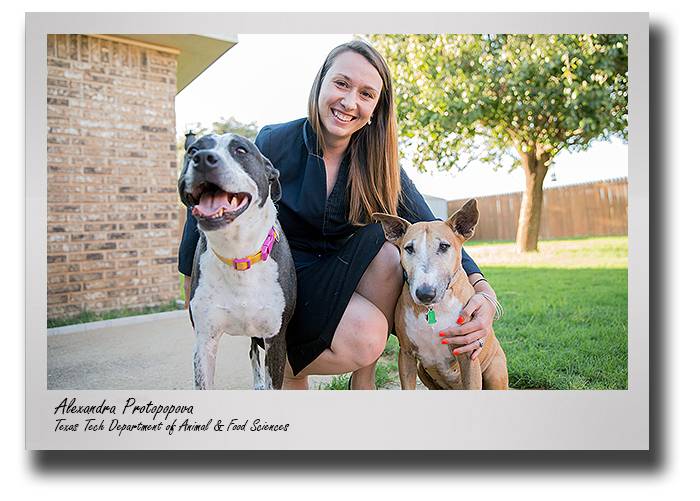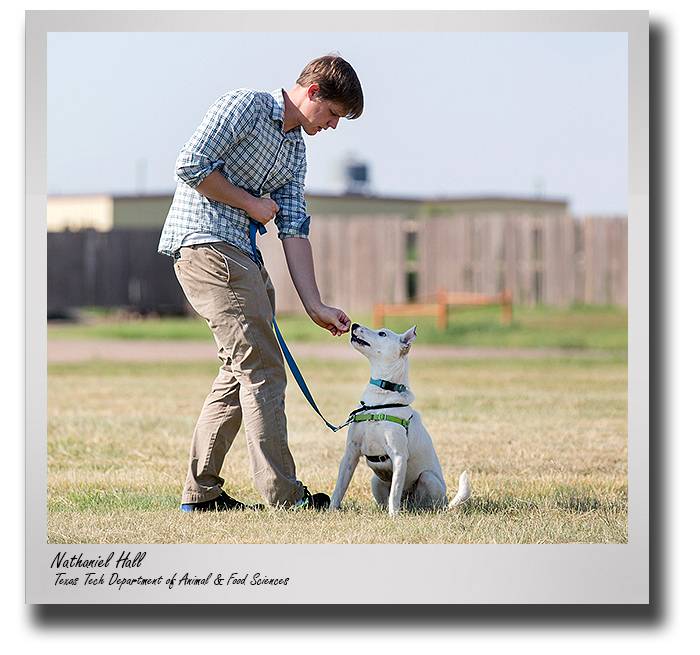AFS researchers earn pair of grants from National Institutes of Health
By: George Watson
 Alexandra Protopopova and Nathaniel Hall, faculty members in Texas Tech's College of Agricultural Sciences & Natural Resources,
have established themselves as two of the most prominent companion animal science
researchers in the U.S. Their work with dogs has brought about results that have increased
the adoptability of shelter dogs and shown the techniques that most aid in that endeavor.
Alexandra Protopopova and Nathaniel Hall, faculty members in Texas Tech's College of Agricultural Sciences & Natural Resources,
have established themselves as two of the most prominent companion animal science
researchers in the U.S. Their work with dogs has brought about results that have increased
the adoptability of shelter dogs and shown the techniques that most aid in that endeavor.
Now, they're turning their attention to how dogs can affect human health as well. Protopopova and Hall, both assistant professors in the Department of Animal & Food Sciences, are co-principal investigators on research projects involving the use of therapy dogs that have earned grants from the Eunice Kennedy Shriver National Institute of Child Health and Human Development, a part of the National Institutes of Health (NIH). It is the first time on record any member of the department has received an NIH grant.
Protopopova and Wes Dotson, an associate professor in the Department of Educational Psychology & Leadership and director of the Burkhart Center for Autism Education & Research in the College of Education, have been awarded a two-year grant from the (NIH) for a research project to investigate the mechanisms that lead children with autism spectrum disorder (ASD) to display improved social behavior.
Hall and Jason Van Allen, an assistant professor and clinical program co-director in the Department of Psychological Sciences in the College of Arts & Sciences, will examine how the physical activity of preadolescent children who have a dog compares to the activity of those who do not, how much the dog's and child's physical activities mesh with each other, and how much a child's attachment to the dog determines the amount of physical activity they share.
 Therapy Dogs & Autism. Past research has shown that animal-assisted interventions, or therapy using dogs,
can increase social behavior in children with ASD. With one in 59 children diagnosed
with ASD, according to the Centers for Disease Control (CDC), understanding why this happens is crucial to improving their development through
childhood and into adulthood.
Therapy Dogs & Autism. Past research has shown that animal-assisted interventions, or therapy using dogs,
can increase social behavior in children with ASD. With one in 59 children diagnosed
with ASD, according to the Centers for Disease Control (CDC), understanding why this happens is crucial to improving their development through
childhood and into adulthood.
Children with ASD struggle with social and conversational skills, which can lead to difficulties in forming and maintaining social relationships, potential depression, poor school performance and struggling to land and maintain employment. While therapy dogs used in a classroom setting have helped children with ASD display more social behavior, the mechanics behind that improvement have not been discovered.
The grant, which could potentially top $392,000 depending on renewals and budget increases, will fund a project that hopes to identify the mechanisms involved in the social-enhancing effect of dogs on children with ASD by using therapy dogs in an established group social skills instruction program. Researchers also will design experiments to observe comparisons between children and measure physiological and behavioral outcomes.
"We are very excited that this important research is sponsored as the outcomes will lead to significant enhancements in the current understanding of animal-assisted interventions for children with ASD," Protopopova said. "Our team combines two different scientific disciplines – animal science and applied behavior analysis. This interdisciplinary approach is particularly suited to understanding how and why dogs improve social behavior in children with autism. As social impairments are hallmarks of autism, this research will directly address a fundamental need."
For the experiment, Protopopova and Dotson will bring 72 children with ASD into group social skills instruction classes taught by six licensed therapists. Each child will go through a 10-week class where one of three things will happen – a therapy dog will be involved for the first five weeks of the class or the last five weeks of the class, or the class will not involve a therapy dog at all. Therapists will teach these courses repeatedly across the three cycles of the program, with children rotating through each condition so each child has experienced each type of class.
During the classes, researchers will measure social behavior, stress behavior, heart rate, electrical conductivity of the skin and salivary cortisol concentrations of children and therapists and compare the results across all conditions. How a child's social behavior toward both the dog and his or her peers, as well as the changes in the quality of the therapists' instruction, both with dogs and without dogs, will be assessed and compared as well.
Protopopova and Dotson believe the project will show the integration of therapy dogs results in reduced stress and improved social behavior, repeated exposure to the dogs will increase both the amount of time desired to spend with the dog and the dog's social-enhancing effects, and that therapists will experience less stress and lead to more social behavior and higher quality instruction during sessions that include dogs.
"The Burkhart Center is dedicated to conducting research that both improves the lives of individuals on the autism spectrum and also contributes through research to the collective knowledge about what interventions work and why they work for the children on the spectrum we serve," Dotson said. "Difficulty and anxiety around social interaction are a defining characteristic of ASD, and there is an urgent need to identify and refine interventions to address that challenge.
"This grant is an exciting collaboration that will help us better understand the role therapy dogs play in the social responses and interactions of children with ASD in social situations with peers and adults. The results will have implications for how therapy dogs can be used to facilitate inclusion and relationship formation for children on the spectrum."
 Children, Dogs & Play. Hall said research by the Centers for Disease Control (CDC) show approximately 70 percent of children fail to meet the national recommendations
for daily physical activity. Statistics also have shown that almost 32 percent of
children age 2-19 are classified as either overweight or obese.
Children, Dogs & Play. Hall said research by the Centers for Disease Control (CDC) show approximately 70 percent of children fail to meet the national recommendations
for daily physical activity. Statistics also have shown that almost 32 percent of
children age 2-19 are classified as either overweight or obese.
Conversely, 51 percent of children have a dog in the home, according to a 2006 Gallup poll, and 90 percent of those children report spending at least 30 minutes per day playing with the dog. Hall said that suggests pets may play an important role in the amount of time children engage in physical activity.
Yet not much is really known about the correlation between children who own pets and their health habits. This research grant, which will total just over $70,000 per year for two years, will allow Hall and Van Allen to develop a model of the contribution of pet dogs to physical activity of a child in a way that can develop efforts to prevent childhood obesity by using objective measures of physical activity of both the child and the dog.
"This grant will help us develop a new measure of children's physical activity with their pet dogs using objective accelerometers," Hall said. "This will help us evaluate whether pet dogs encourage a healthier, physically active lifestyle for children and whether the bond between a child and dog is related to their synchronous physical activity."
Their theory is that children with a dog will engage in more types of physical activity than those without a dog, and that a pet owner's activity will be directly related to the dog's activity and attachment to the dog. "Our long-term goal with this study is for it to help us design better interventions to increase physical activity in children," Van Allen said. "Our study may help us determine whether there are certain types of activities that children do with their dogs that result in more vigorous physical activity that increases their heart rate and is more beneficial for their health, or determine whether there are certain dog characteristics that are important for mutual activity.
"Then, we can use that information to design interventions for physical activity that might include a tailored recommendation for individuals that specifically involves their pet dog, which is rarely done in physical activity interventions currently available for children."
CONTACT: Michael Orth, chairman, Department of Animal and Food Sciences, Texas Tech University at (806) 834-5653 or michael.orth@ttu.edu
1017NM18
Editor's Note: Those interested in participating in the research by Hall and Van Allen can email EnergyLabTTU@gmail.com or call (806) 834-7703
Davis College NewsCenter
-
Address
P.O. Box 42123, Lubbock, Texas 79409-2123, Dean's Office Location:Goddard Building, Room 108 -
Phone
(806)742-2808 -
Email
kris.allen@ttu.edu
